Last month we featured a review of Charles Warren: Royal Engineer in the Age of Empire – this month we Meet the Author: historian and biographer Kevin Shillington.
ED: As a historian you have written extensively, with much passion, about many subjects connected to the history of Africa. Could you tell us a bit about your academic career, and where it took you?
KS: I graduated in Modern history from Trinity College Dublin, followed by a Post-Graduate Certificate of Education from the University of Zambia.
It was my first experience of Africa and I was quickly hooked, staying for six years, teaching history and English at secondary school in Zambia.
This was followed by an MA and PhD in African History at SOAS University of London, and then to Botswana where I taught history and trained history teachers during the 1980s.
Since then I have been a UK-based independent historian specialising in African History and Biography.
ED: General Sir Charles Warren Royal Engineer – what first piqued your interest in writing his biography, and it is the first one for 80 years I understand?
KS: Yes, the first full-length biography of Charles Warren was by his grandson, published in 1941. Since then there have been three other books about specific aspects of Warren’s life, his Jerusalem archaeological work, his involvement in the Anglo-Boer War and one on his Freemasonry, WARREN! The Bond of Brotherhood, by Bro Colin Macdonald. But mine is the first full-length study of his whole life since 1941.
I first came across Warren while doing my PhD research in southern Africa.
My interest in him was sparked by his clash in the 1880s with the diamond-mining magnate Cecil Rhodes over the latter’s land-grabbing style of colonialism.
At that stage I was not aware of any other aspects of Warren’s life, but I gradually accumulated more and more information about him over the years until I felt ready to write a reassessment of his life and work.

Cabinet Cart photo of Charles Warren (1840-1927) Elliott & Fry, 1886
IMAGE LINKED: wikimedia Attribution 4.0 International (CC BY 4.0)
ED: Most people, when hearing the name Charles Warren, connect him with the police investigation surrounding ‘Jack the Ripper’ – he was Commissioner of the London Metropolitan police at the time.
It was a hard time for him and accusations were somewhat unfounded.
I believe his Masonic membership has also been dubiously cited as part of the general conspiracy theory that the Freemasons were involved in the Ripper murders?
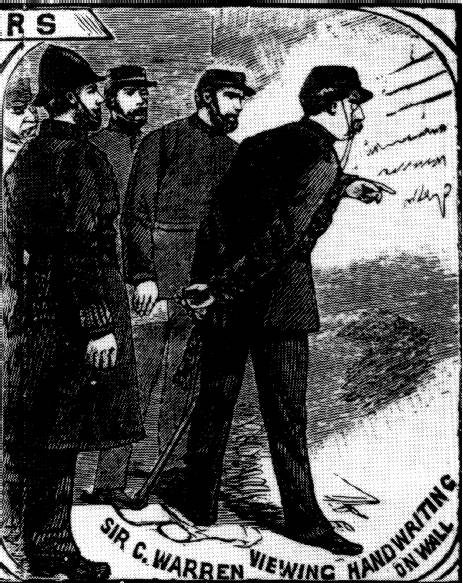
Sir Charles Warren viewing handwriting on wall, October 1888
IMAGE LINKED: wikimedia Attribution 4.0 International (CC BY 4.0)
KS: There’s a whole genre of literature, known as Ripperology, that has grown up around this series of murders and made the man responsible into the world’s most notorious serial killer.
Most new books in the genre claim to have identified the killer, although much of the ‘evidence’ is circumstantial and the focus has often been on the gory details of the mutilations of the unfortunate victims.
A couple of these books assume there must have been a secret conspiracy to explain why the killer was never publicly identified, and of course, the secrecy around Freemasonry makes them an easy suspect.
From that it has been assumed, at least in a couple of cases, that Charles Warren, a prominent Freemason of the time who happened to be in charge of the Metropolitan Police, must somehow be involved in a cover-up.
I deal with the strongest allegation of that in my book. And of course, people will have to read the book to find out my conclusions.

Views from a model of Gibraltar in Gibraltar Museum. It was completed in 1865 from a survey by Lt. Charles Warren R.E. Photo by Jim Crone
IMAGE LINKED: wikimedia Attribution 4.0 International (CC BY 4.0)
ED: Warren became a Freemason in Gibraltar as a Lewis, can you expand on his Masonic career for us, and how he applied it to his life?
KS: Warren was initiated into Freemasonry when he was still only 19, by special dispensation granted to a Lewis.
He took its principles of honour and duty seriously and appreciated the fraternal bond that it offered.
He progressed rapidly in the Craft during his years in Gibraltar and became the Master of a Lodge at the age of 22.
After Gibraltar, though valuing the brotherhood of Freemasonry – and it often helped during difficult times in his career – he does not appear to have actually become a member of any other specific Lodge, though at least one was named in his honour.
He was always interested, however, in Masonic research and when a group of Masons wanted to found a Lodge dedicated to such research they approached Warren to be the Founding Master of what became the Quatuor Coronati Lodge in 1886.
Later, when serving as the General Officer Commanding the troops in Singapore, he was installed as the District Grand Master of the Eastern Archipelago.

Copy of Petition and subsequent Consecration of Quator Coronati Lodge displaying the name of their Founding Master Charles Warren, B’Colonel, R.E., P.M. Lodge of Friendship, No. 278, and Charles Warren Lodge, No. 1832. (amongst others) Vol 1 of Ars Quatuor Coronatorum : being the transactions of the Lodge Quatuor Coronati, no. 2076, London, 1895
IMAGE LINKED: Ars Quatuor Coronatorum Attribution 4.0 International (CC BY 4.0)
ED: In my review of your book, I said that I felt Warren ‘was in the Empire rather than of the Empire’ – he seemed to be of a different ilk to characters such as Cecil Rhodes, whom Warren called out for his ‘rapacious colonialism’.
As a historian, how do you feel about the current discourse about an era far removed from our own – rewriting or erasing history is not the answer, so how do we reconcile these concerns?
KS: I agree that erasing history is not the answer, though in my view removing a few statues does not erase history.
History is constantly rewritten as new evidence and different perspectives come to the fore. The history of the true impact of empire and colonialism, however, has often been erased from the sort of history taught in schools in Britain.
And if this were properly confronted within Britain’s image of its empire, there might be wider understanding that these old imperialists and slave traders were men of their time, whose statues perhaps need no longer be so preciously protected and so prominently celebrated.
ED: Before reading your book, I had no idea Warren had been an archaeologist – his research work for the Palestine Exploration Fund involved some incredible discoveries in the Holy Land.
He was a bit of an ‘Indiana Jones’ character – is it right he went tunnelling under the Holy City of Jerusalem in search of evidence of the Temple of Solomon and Herod the Great?
KS: Interesting you should mention ‘Indiana Jones’ because in the Gibraltar Public Library I came across an article about Charles Warren that used that name in its title.
Warren certainly was a fearless and adventurous figure who did indeed tunnel under what is today known as the ‘Old City’ of Jerusalem, though he never carried a whip as an essential tool in his explorations.
Basically, he was commissioned to find out the lie of the land at the time of Jesus and Herod the Great 2000 years ago.
But as a keen Freemason interested in Masonic Research, he was of course keen to find any evidence of the Temple of Solomon whose stone masons were, according to Masonic tradition, the founding fathers of Freemasonry.
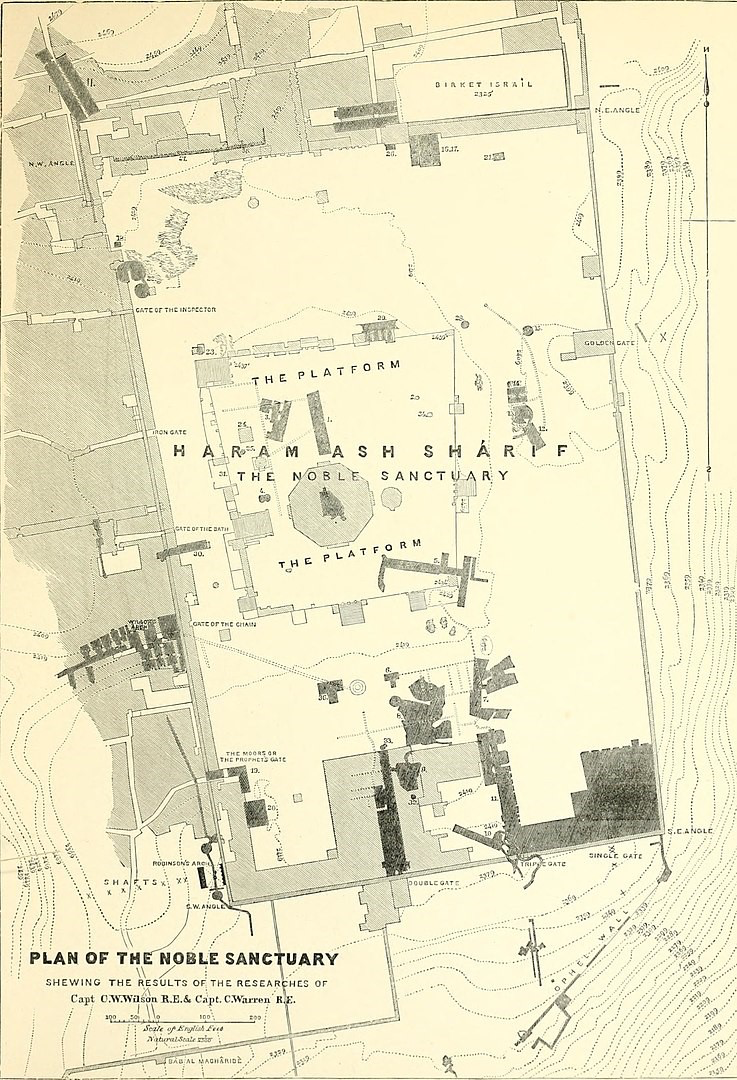
Plan of the Noble Sanctuary (Haram al-Sharif) from “The survey of Western Palestine-Jerusalem” (1884)
By Internet Archive Book Images
IMAGE LINKED: wikimedia Attribution 4.0 International (CC BY 4.0)
ED: His military career was a long and largely successful one but he was made somewhat of a scapegoat over his leadership during the Second Boer War – what happened that tarnished his name so badly and do you feel he has been vindicated over the years?
KS: The problem arose over British attempts to relieve the South African garrison town of Ladysmith to which the Boers had laid siege at the beginning of the war.
After failing in one attempt to relieve the town, the British Commanding General Sir Redvers Buller gave the task to his second-in-command, Lieutenant General Sir Charles Warren.
Warren did not agree with the route he was ordered to take, but was obliged to make the attempt, which, as he could have predicted, failed in what became one of the biggest British disasters of the war.
Buller placed all the blame on Warren whom he portrayed as incompetent. In the book I see to what extent Warren’s reputation can be restored.
ED: After his retirement he joined with Robert Baden-Powell to form the Boy Scout movement. The Scouts are often linked to Freemasonry due to their similar values; Warren was a Mason but Baden-Powell wasn’t – however, I imagine they had much in common from their military careers – did their paths cross in Africa?
KS: Baden-Powell was quite a bit younger and junior to Warren in rank and their paths did not cross in Africa.

Baden-Powell on a patriotic postcard in 1900
IMAGE LINKED: wikimedia Attribution 4.0 International (CC BY 4.0)
ED: Purely from a historian/researcher and writer’s point of view, what would be your advice for budding authors on approaching the writing of a biography?
From my own experience I know it’s no mean feat, and every writer does things differently, but we would be very interested to hear your advice.
KS: Everybody starts with the advantage of knowing something about the subject, otherwise you would not have chosen them.
You then need to ask yourself, honestly, why do I want to write about this person and is it something interesting enough that people will want to read the book?
You then have a general approach in mind, which may well be adapted and changed during the course of research.
Research: To some extent this depends on whether it’s contemporary or historical. If the subject is still alive, it depends on whether or not the subject will co-operate.
And if so a lot of information may be gleaned from interviewing the subject and his or her family and contemporaries (friends and critics) and backing this up by what documentation, including newspapers, you can get hold of.
If it is someone who has died during the past century, I would recommend starting with obituaries, assuming the person was prominent enough to earn such a thing.
This gives you a view of what other people consider are the most important points in a person’s life (which you may or may not agree with).
The holy grail of biographical research is private correspondence. It reveals so much about a person’s character and motivation, both from what is said and, sometimes, what is not said.
So it is a big help if you can get hold of private family papers – some are kept in libraries and archives, others retained by the family, which may require a great deal of tact and trust.
For historical biographies, most of it will be archival work, including obscure things like census records, wills etc.
And for the 19th century onwards newspapers are particularly valuable, though need to be treated with caution and an awareness of their point of view or bias.
As soon as you feel you have just enough information, start writing!
You don’t have to complete all your research before starting to write, and don’t worry too much about whether you are writing the last word at this stage.
Plenty of time for revision as you develop ideas at later stages, and the very act of writing may raise new questions and lead you into new areas of research.
If it is a thematic biography, I would recommend starting with the chapter you think is most important.
For narrative biography, I like to start at the beginning, and trace the evolution of person, character and motivation through the passing years.
Keep asking yourself the question ‘Why?’ of the actions, and things that happen around your subject.
A biographer is explaining a life rather than just listing a series of events.
Therefore, whichever way you approach it, try to have a general theme that runs and develops through the book, and is possibly related to the reason you were first interested in writing about this person.
Partly for that reason, the preface or introduction tends to be the last thing I write, when I have the entire book in my head.
ED: Thank you so much for answering our questions and introducing us to the fascinating and adventurous life of Sir Charles Warren – and of course, huge congratulations on the publication of the book.
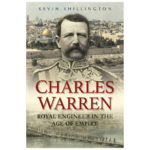
Book Review – Charles Warren: Royal Engineer in the Age of Empire
Sir Charles Warren, the Police Commissioner who failed to catch ‘Jack the Ripper’
more….
Article by: Philippa Lee. Editor

Philippa Lee (writes as Philippa Faulks) is the author of eight books, an editor and researcher.
Philippa was initiated into the Honourable Fraternity of Ancient Freemasons (HFAF) in 2014.
Her specialism is ancient Egypt, Freemasonry, comparative religions and social history. She has several books in progress on the subject of ancient and modern Egypt. Selection of Books Online at Amazon
Books by Kevin Shillington
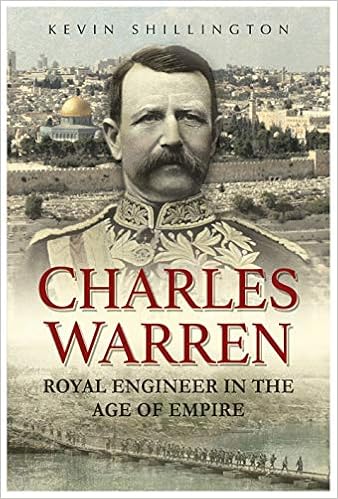
CHARLES WARREN : Royal Engineer in the Age of Empire
By: Kevin Shillington
The life of Charles Warren Royal Engineer is a compelling story, full of action, conflict, triumph and disaster, with reputations gained and lost.
All set against the background of an expanding British Empire. It is a tale of secrecy, Freemasonry and pioneering archaeology as the young Lt Warren, still only in his twenties, tunnelled under the Holy City of Jerusalem in search of evidence of the Temple of Solomon and Herod the Great.
A man of high principle and dogged determination Warren thrived on a challenge: searching for lost British spies in the desert of the Exodus, or publically calling out the rapacious colonialism of Cecil Rhodes. Later, in different circumstances, he ordered the arrest of Winston Churchill.
Although thrice knighted for his many achievements, Warren is most widely remembered as the controversial Metropolitan Police Commissioner who failed to catch Jack the Ripper .
In the end he faced the supreme challenge in the Anglo-Boer War, becoming the scapegoat for one of Britain’s greatest military disasters, the Battle of Spion Kop.
In this new biography, the first for 80 years, historian and biographer Kevin Shillington delves into the records and presents a reassessment of Warren s reputation.

History of Africa
By: Kevin Shillington
This fourth edition of this best-selling core history textbook offers a richly illustrated, single volume, narrative introduction to African history, from a hugely respected authority in the field.
The market-leading range of illustrated material from prior editions is now further improved, featuring not only additional and redrawn maps and a refreshed selection of photographs, but the addition of full colour to make these even more instructive, evocative and attractive.
Already hugely popular on introductory African History courses, the book has been widely praised for its engaging and readable style, and is unrivalled in scope, both geographically and chronologically – while many competitors limit themselves to certain regions or eras, Shillington chronicles the entire continent, from prehistory right up to the present day.
For this new edition, both content and layout have been thoroughly refreshed and restructured to make this wealth of material easily navigable, and even more appealing to students unfamiliar with the subject.
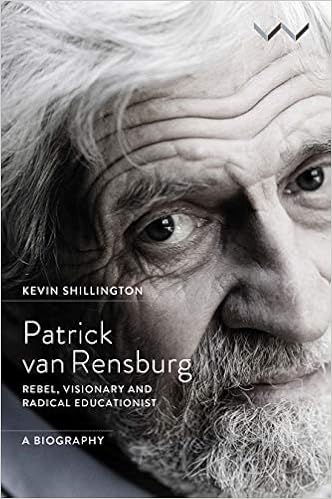
Patrick van Rensburg: Rebel, Visionary and Radical Educationist,
By: Kevin Shillington
Patrick van Rensburg (1931-2017) was an anti-apartheid activist and self-made ‘alternative educationist’ whose work received international recognition with the Right Livelihood Award in 1981.
Born in KwaZulu-Natal into what he described as a ‘very ordinary South African family that believed in the virtue of racism’, Van Rensburg became a self-styled rebel who tirelessly pursued his own vision of a brighter future for emerging societies in post-colonial southern Africa.
His emotional and intellectual struggle against his upbringing and cultural roots led him to reject his life of white privilege in South Africa.
Determined to prevent the emergence of a privileged black elite in post-colonial society, he devoted his life to implementing an alternative, egalitarian approach to education, focusing on quality and functional schooling for the majority.
Rewarded with the internationally prestigious Right Livelihood Award for his unique contribution to education, he saw this work as a ‘necessary tool of development’.
Exiled from South Africa in 1960 because of his involvement in the London boycott campaign that gave birth to the Anti-Apartheid Movement, Van Rensburg moved to Botswana (then Bechuanaland).
There he founded cooperatives, provided vocational training and was among the earliest educationists to espouse the discipline of development studies.
Perhaps his best-known legacy is the Swaneng Hill School, which he founded to provide an educational home for primary school ‘dropouts’ through a curriculum that combined theory and practice, and academic and manual labour.
He involved his pupils in building their school, running it, providing their own food, and making their own equipment and furniture.
Van Rensburg was an innovative and charismatic visionary who captured the zeitgeist of the late twentieth century, and whose work and vision still have resonance for debates in educational policy today.
Recent Articles: in meet the author series
 Meet The Author - Albert Mackey As a contributor to the literature and science of Freemasonry, Doctor Mackey's labours have been more extensive than those of any other in America or in Europe. |
 Philippa Lee talks Masonry and metaphysics with Ben Zion, the author of two must-have books on esoteric Freemasonry. |
 Meet The Author - Robert Freke Gould A brief look at his life, Gould was a soldier, barrister and prominent Freemason and Masonic historian. He was also one of the founders of Quatuor Coronati Lodge in 1886 |
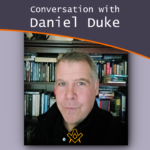 In Conversation with…Daniel Duke Author Daniel Duke talks to Philippa Lee about his new book 'Secret History of the Wild, Wild West' the third in a series on Outlaws, secret societies and hidden treasure. Dan is the great-great grandson of the infamous Jesse James, and the definitive authority on the subject. |
 Mike's Masonic Walks and Talks Mike Neville offers walks and talks primarily around London, based on his vast knowledge of the area and his specialist subjects, which cover all aspects of Masonic history, and some unique insight into the more shady side of 'Crime and the Craft'. |
 Darren Lorente-Bull is the author of 'The Other Brotherhood: When Freemasonry Crossed the English Channel' and five other books. Here he talks to Philippa Lee about his beliefs, his Freemasonry, and books. |
 Meet The Author - Angel Millar This month I am delighted to interview Angel Millar – author of five books on Freemasonry, esotericism, and world spiritual and initiatory traditions. |
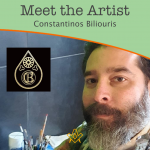 Constantinos Biliouris is a Greek Artist and brother from the Grand Lodge of Greece who creates a range of hand painted masonic aprons. |
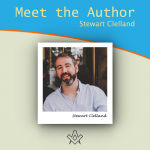 This month Editor Philippa Lee meets Stewart Clelland the author / translator of The Green Book of The Élus Coëns |
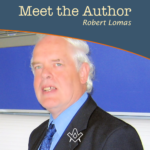 Editor Philippa Lee interviews well-known Masonic author Dr Robert Lomas |
 This month we feature ten of our recommended Masonic authors ranging from the early 1900s to the modern day, and we offer our 'Square choice' of their books. |
 We talk with ‘Brother Hogarth’ who is currently writing a series of articles featuring the Masonic art of William Hogarth. |
 If you would like your work to be featured in The Square, please take a look at our submissions guidelines and send any ideas or contributions to the Editor for our consideration. |
 A slight deviation from our usual 'Meet the Author' theme but equally as interesting, we have a 'Portrait of an Artist' - Travis Simpkins - the man capturing the likeness of Freemasons worldwide! |
 This month we Meet the Author: historian and biographer Kevin Shillington. |
 This month in 'Meet the Author' we look at the life and work of Carl H. Claudy, a prolific Masonic author who believed that Masonic education is the foundation for the Fraternity. |
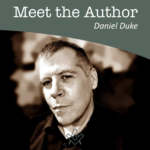 Daniel Duke, the great-great grandson of Jesse James, grew up surrounded by stories of lost outlaw treasures. |
 Stephen Dafoe - numerous books on the Knights Templar, and Morgan: The Scandal That Shook Freemasonry. |
 Paul Sparks – author of A Guide for the Masonic Treasurer |
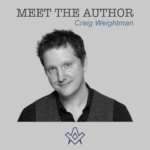 Craig Weightman – author of A Journey in Stone |
masonic knowledge
to be a better citizen of the world
share the square with two brothers

click image to open email app on mobile device






